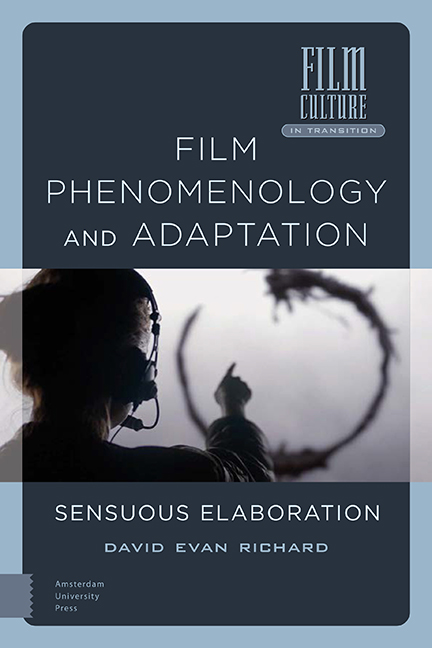Book contents
- Frontmatter
- Contents
- Acknowledgements
- List of Figures
- Introduction: A ‘Fleshly Dialogue’
- 1 Grave Visions: Visual Experience and Adaptation
- 2 Resonance and Reverberation: Sounding Out Screen Adaptation
- 3 Textural Analysis: Touching Adaptation
- 4 Textures of Imagination
- 5 (Re-)Mediating Memory’s Materiality
- Conclusion: Body Language
- Bibliography
- Filmography
- Index
Introduction: A ‘Fleshly Dialogue’
Published online by Cambridge University Press: 27 May 2021
- Frontmatter
- Contents
- Acknowledgements
- List of Figures
- Introduction: A ‘Fleshly Dialogue’
- 1 Grave Visions: Visual Experience and Adaptation
- 2 Resonance and Reverberation: Sounding Out Screen Adaptation
- 3 Textural Analysis: Touching Adaptation
- 4 Textures of Imagination
- 5 (Re-)Mediating Memory’s Materiality
- Conclusion: Body Language
- Bibliography
- Filmography
- Index
Summary
Abstract
This chapter positions the book in the extant scholarship of adaptation and phenomenology. It establishes the book's argument that in order to ‘make sense’ of adaptations as adaptations, we must first attend to their sensual presence: their look, their sound, their touch, and how they materialize in the embodied imagination. This chapter builds on foundational adaptation scholarship by Robert Stam, Linda Hutcheon, and Christine Geraghty who advance an intertextual approach to studying adaptation. Rather, this chapter employs the existential phenomenology of Maurice Merleau-Ponty—and how it has been adapted to film studies by Vivian Sobchack—to propose an intersubjective account of adaptation.
Keywords: adaptation; film-phenomenology; perception; synaesthesia; embodiment
If Only You Could See What I’ve Seen with Your Eyes
Film Phenomenology and Adaptation: Sensuous Elaboration draws its name from Susan Sontag's ‘The Imagination of Disaster’, an essay that considers screen adaptation as a phenomenon in all senses of the word. Although discussing the particular case of science fiction novels adapted for the screen, Sontag's article nonetheless evokes the stigma that tends to be attached more generally to screen adaptation that concerns the difference between modes of aesthetic engagement. Reading a novel requires imagination and cognition, while, as Sontag puts it, in lieu of ‘an intellectual workout, [these films] supply something that novels can never provide—sensuous elaboration’. Yet Sontag's words do not comfortably sit with my experience of many film adaptations that certainly do demand an ‘intellectual workout’—and more— of its spectator. Indeed, adaptation theorists have adequately challenged the assumption that the experience of literary and cinematic arts might demand different responses of their beholder, that literature requires imaginative engagement, for instance, while a film simply appeals to the senses. In doing so, these scholars have overthrown any hierarchies of value that are implicitly (or explicitly) formed in such categorizations: that novels are complex, demanding, and therefore worthy, while films are dismissed as facile entertainments, with the particular form of the film adaptation seemingly furthest removed from the realm of art due to its fundamentally derivative nature.
I build on this scholarship to further advocate that film adaptations certainly do involve an ‘intellectual workout’.
- Type
- Chapter
- Information
- Film Phenomenology and AdaptationSensuous Elaboration, pp. 11 - 42Publisher: Amsterdam University PressPrint publication year: 2021



